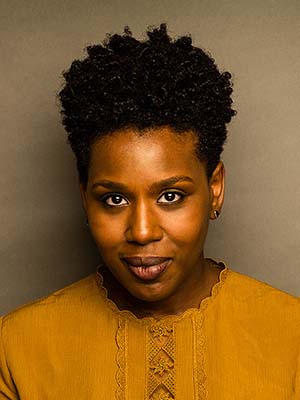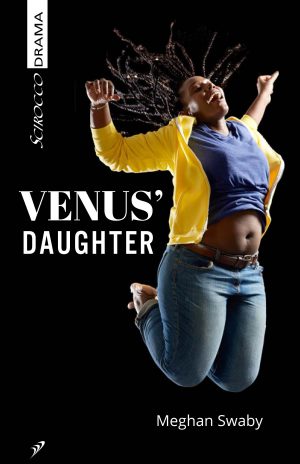Posted September 11, 2025
The Interview – Meghan Swaby
Meghan Swaby
Meghan Swaby is a first-generation Jamaican-Canadian actor and playwright based in Toronto. Her play Venus’ Daughter was produced by Obsidian Theatre in 2016 and was included on The SureFire List (Playwrights Guild of Canada) as one of the top 23 recommended plays in Canada. She has participated in various playwriting residencies over the years, with companies such as Nightwood Theatre, Obsidian Theatre, Diaspora Dialogues, Playwrights Workshop Montreal, and the Stratford Festival. Her work has been performed internationally and was included as part of 50in50: Writing Black Women Into Existence at the Billie Holiday Theatre (Brooklyn, NY). Meghan’s writing was included in the anthology Black Lives, Black Words (Oberon Playwrights Press 2017). Meghan is a graduate of University of Windsor (Acting) and alumni of Shakespeare Globe (UK). She currently has several works in development including commissions with Museum of Toronto and The Stratford Festival, and a podcast about Caribbean folklore.
Meghan, your play Venus’ Daughter has been very successful, produced in Canada by Obsidian Theatre. Tell us a little about the play.
Venus’ Daughter tells the story of Denise, a young Black woman whose life is ruptured by the arrival of Venus, the ancestral spirit of Sara Baartman. Baartman, a Khoisan woman exploited and exhibited in 19th-century Europe under the cruel nickname “Hottentot Venus,” embodies a legacy of racial and sexual objectification. Through Venus’ presence, Denise is compelled to confront the gaze imposed on Black female bodies, the weight of intergenerational trauma, and the possibility of healing.
How did you become interested in the story of Sara Baartman?
I started writing the play while participating in Nightwood Theatre’s Write from the Hip program. I came across a YouTube video about the story of the “Hottentot Venus.” The very next video in my queue was Nicki Minaj’s Anaconda music video. Sparks went off in my head — I was flooded with questions about how we speak about Black women’s bodies, the admiration, the outrage, the fascination, the curiosity, and the mimicry they so often provoke.
Too often, Baartman’s story is told only through tragedy. Venus’ Daughter explores her resilience, desire, and enduring impact, showing how the past and present constantly speak to each other. Venus’ Daughter is not simply a historical retelling, it is about how the fragmented past and present speak to each other — at all times.
What themes are you exploring in the play?
At its heart, the play asks what it means to inherit a history of objectification and spectacle, all while living in a larger Black body — while also seeking to reclaim identity, pleasure, and agency. Writing this play raised me; the play is both a reckoning and a celebration, a way to confront difficult truths while taking the leap to embrace joy and ultimately healing.
You’ve also written a musical, Parkdale, (with composer Chris Tsujiuchi.) How did that project evolve?
During lockdowns, I was part of Musical Stage Company’s Noteworthy cohort and was introduced to Chris Tsujiuchi through that program. It was wonderful. (That is also where I connected with my other collaborator, the incredible Jewelle Blackman.)
Parkdale came directly out of the First Drafts commission with the Sheridan Musical Theatre program. Chris and I live about seven minutes from each other and when we had our first brainstorming session on a bench on Church Street, something that resonated deeply with us was the idea of a home — an imperfect sanctuary, an apartment complex with individuals that may annoy you, but one you grow to appreciate and maybe even love. I think of some of my favorite neighbourhoods in the city, the storytelling on its sidewalks, its diversity, resilience, and the larger-than-life characters. It was actually pretty smooth to come up with a band of characters for this world. We both imagined Parkdale as Urinetown meets Little Shop of Horrors.
What are the particular challenges and joys of writing musicals?
This was my first time writing the book of a musical and I love it, it scares me, but it’s so fun. The hardest part of writing a musical is making sure the book (the skeleton) moves the story forward, not just repeating what the music and lyrics communicate. Musicals are my first love; I always get goosebumps when the words and music click, it’s truly magic.
The video project you wrote, Derailed: The History of Black Railway Porters in Canada, won the 2022 Heritage Toronto Public History Award. Tell us about that experience.
In 2019 I was commissioned by Museum of Toronto to adapt Cecil Foster’s essential book They Call Me George: The Untold Story of Black Train Porters and the Birth of Modern Canada.
The book chronicles the lives of Black railway porters in Canada, who, despite facing racism and being called “George,” fought for civil rights. Their activism helped challenge discriminatory laws and shaped Canada’s journey toward multiculturalism. The Black railway porters’ story is essential to Canadian history but is often overlooked. They endured long hours and systemic racism yet built strong communities and helped shape the labour movement. Derailed was about honouring that legacy and ensuring those voices are heard. Receiving the Heritage Toronto Award was affirming; it showed there’s a hunger for these histories to be recognized and remembered. As a first-generation Jamaican-Canadian, I benefit firsthand from the courageous and relentless folks who fought to overturn discriminatory labour laws that upheld the image of Canada as the “Great White North.”
The original idea was to write and direct a live theatrical adaptation at the Railway Museum at what is now the Steam Whistle Brewery. With Covid 19 and lockdowns the project was shifted to a digital presentation (which was great because it allowed more people to access the work). I was able to collaborate with director Byron Kent Wong and his team at zero11zero and Iron Bay Media and Union Station to bring this project to life. Major shout-out to Nadine Villasin Feldman (Director of Programming at that time) and her team for all their support!
You have a busy career as both playwright and actor. What is it about the art of storytelling that calls to you? Why are stories important?
Storytelling is vital. It is in my blood. I come from a line of amazing Black women who taught me the value of storytelling in grocery lines, church basements, hair salons and workplace breakrooms. Whether it’s the swelling of laughter on sidewalks between friends or recalling memories to family members across oceans, storytelling keeps me connected and reminds me of the importance of witnessing. It has the power to make someone feel seen or understood, while also having the power to do the exact opposite.
Tell us about your podcast, Beneath the Ceiba Tree.Beneath The Ceiba Tree is a podcast about Caribbean folklore that interweaves research, conversations, family and expert interviews. Exploring how its impact ripples through history to present day and beyond. The idea for this was birthed out of the Crow’s Theatre Podcast in Residence. I had been researching Caribbean folklore for a play I’m writing and came across so many stories and began talking to my mother about duppy stories she heard growing up in Jamaica. I asked my good friend and artist Sedina Fiati if she wanted to collaborate, and together we completed season one.
Ceiba Trees are sacred across the Western and Central Africa and throughout the Caribbean. The podcast is built on the idea that these sacred trees have magic in their roots, as it is the link between worlds.
Can you give us a sneak peek of what you’re working on now?
I’m currently working on a few projects; the first is a new musical with the incredible Jewelle Blackman, called TAR: A MUSICAL. I’m co-writing the book for this story about mental health from a Black woman’s perspective. We meet two women who on the exterior share many similarities, but due to their extremely different upbringings have very different views of themselves, their beauty, and their worth.
The other is a play I’ve written which is an adaptation of Zora Neale Hurston’s short story, “Sweat.”
-
Venus’ Daughter
Price range: $9.99 through $15.95


